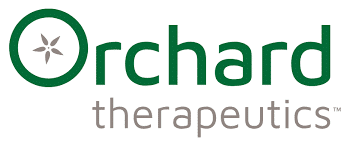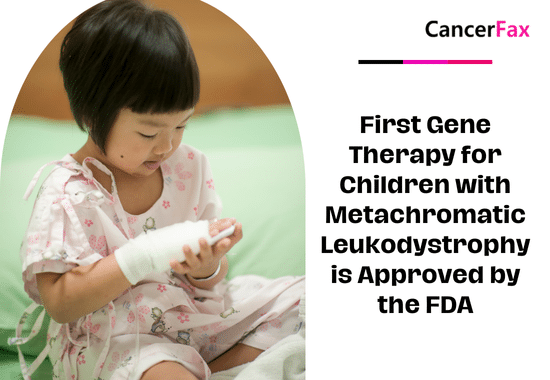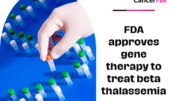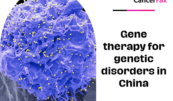First Gene Therapy for Children with Metachromatic Leukodystrophy is Approved by the FDA
FDA approval
The U.S. Food and Drug Administration has granted Lenmeldy (atidarsagene autotemcel) approval. The FDA has approved this gene therapy as the first of its kind for the treatment of children with pre-symptomatic late infantile, pre-symptomatic early juvenile, or early symptomatic early juvenile metachromatic leukodystrophy (MLD).
Metachromatic leukodystrophy (MLD)
Metachromatic leukodystrophy is an uncommon, incapacitating hereditary disorder that specifically impacts the brain and nervous system. The condition is a result of a lack of the enzyme arylsulfatase A (ARSA), which causes an accumulation of sulfatides (fatty substances) within the cells.
This accumulation leads to harm to both the central and peripheral nervous system, resulting in the deterioration of motor and cognitive abilities and premature mortality. The prevalence of MLD in the United States is estimated to be one in every 40,000 individuals. MLD is an incurable condition, and the usual approach to therapy is centered around providing support and managing symptoms.
“This is the initial treatment option that has received approval from the FDA for children affected by this uncommon genetic disorder,” stated Peter Marks, M.D., Ph.D., the director of the FDA’s Center for Biologics Evaluation and Research (CBER). “We are dedicated to promoting scientific and regulatory principles that facilitate the efficient development and evaluation of safe, effective, and groundbreaking products that can potentially improve the lives of patients.”
Lenmeldy
Lenmeldy is a unique and personalized treatment that involves a single infusion of the patient’s own hematopoietic stem cells (HSCs), which have been genetically altered to contain functional versions of the ARSA gene. The stem cells are harvested from the patient and genetically edited by introducing a functional copy of the ARSA gene. The altered stem cells are reintroduced into the patient’s body, where they adhere and reproduce within the bone marrow.

The changed stem cells give the body myeloid (immune) cells that make the ARSA enzyme. This enzyme helps break down sulfatides and may stop MLD from spreading. Before receiving treatment, patients are required to endure high-dose chemotherapy, a procedure that eliminates cells from the bone marrow in order to replace them with the modified cells in Lenmeldy.
“MLD is a debilitating illness that significantly impacts the well-being of patients and their families.” “The progress in treatment options provides optimism for better results and the ability to effectively impact the course of disease advancement,” stated Nicole Verdun, M.D., who serves as the director of the Office of Therapeutic Products in CBER. This approval signifies the significant advancement and accessibility of efficacious treatments, including gene therapies, for rare diseases.”
The safety and efficacy of Lenmeldy were evaluated using data from 37 children who participated in two single-arm, open-label clinical studies and an expanded access program. A comparison was made between children who underwent therapy with Lenmeldy and children who did not get any treatment (natural history).
The main measure of effectiveness was survival without serious motor impairment, which was defined as the time from birth to the first instance of losing the ability to move and sit without assistance, or death. Lenmeldy treatment dramatically decreased the likelihood of severe motor impairment or mortality in children with MLD, as compared to those who did not get treatment.

Every kid diagnosed with pre-symptomatic late infantile MLD and treated with Lenmeldy survived until the age of 6, in contrast to just 58% of children in the control group who did not get treatment. By the age of 5, 71% of the children who received treatment were capable of walking independently.
Out of the children who received treatment, 85% had normal language and performance IQ scores, a finding that has not been observed in children who did not receive treatment. Furthermore, children who had pre-symptomatic early juvenile and early symptomatic early juvenile MLD exhibited a deceleration in the progression of motor and/or cognitive impairment.
The predominant adverse effects of Lenmeldy include pyrexia and leukopenia, oral ulcers, respiratory tract infections, dermatitis, catheter-related infections, viral infections, pyrexia, gastrointestinal infections, and hepatomegaly.
Following the administration of Lenmeldy, patients should undergo regular monitoring of their neutrophil counts and the potential for delayed platelet engraftment until engraftment has been successfully attained. Administration of Lenmeldy may potentially lead to the development of thrombosis or encephalitis. Although there is a potential danger of developing blood cancer from this medication, no instances of such cases have been observed in patients who have had Lenmeldy.
Patients who are prescribed this medicine should undergo ongoing monitoring for hematologic malignancies throughout their lifetime. This includes an annual complete blood count (with differential) and, if necessary, integration site analysis for a minimum of 15 years following therapy.
Susan Hau is a distinguished researcher in the field of cancer cell therapy, with a particular focus on T cell-based approaches and cancer vaccines. Her work spans several innovative treatment modalities, including CAR T-cell therapy, TIL (Tumor-Infiltrating Lymphocyte) therapy, and NK (Natural Killer) cell therapy.
Hau's expertise lies in cancer cell biology, where she has made significant contributions to understanding the complex interactions between immune cells and tumors.
Her research aims to enhance the efficacy of immunotherapies by manipulating the tumor microenvironment and exploring novel ways to activate and direct immune responses against cancer cells.
Throughout her career, Hau has collaborated with leading professors and researchers in the field of cancer treatment, both in the United States and China.
These international experiences have broadened her perspective and contributed to her innovative approach to cancer therapy development.
Hau's work is particularly focused on addressing the challenges of treating advanced and metastatic cancers. She has been involved in clinical trials evaluating the safety and efficacy of various immunotherapy approaches, including the promising Gamma Delta T cell therapy.
- Comments Closed
- July 13th, 2024






Arylsulfatase A gene therapy, Childhood genetic disorder cure, FDA-approved genetic treatment, First MLD treatment, Metachromatic leukodystrophy cure, MLD gene therapy, Pediatric neurological disorder therapy, Rare disease breakthrough
🌟 Welcome to Beijing Biotech! 🌟
Thank you for reaching out! We are dedicated to transforming lives through advanced gene therapy solutions for sickle cell disease and thalassemia. Our team is committed to delivering cutting-edge treatments, personalized care, and support on every step of your journey to better health.
Please feel free to ask any questions or let us know how we can assist you. Together, we’re here to make a difference.
Warm regards,
The Beijing Biotech Team